
by Melanie Oda (Japan) | Jul 31, 2014 | 2014, Cultural Differences, Food, Japan, School, World Moms Blog
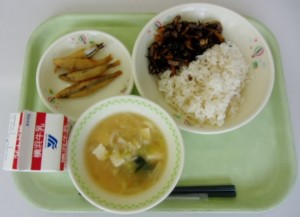
chow_time
I read on the internet a lot about how America is trying to change their school lunch program and make it healthier. And I read a lot about how some people are not happy about this. They complain that kids won’t eat what they don’t like, food gets wasted, etc.
All of that may be true. But I thought I would share what school lunch is like here in Japan.
Children in elementary schools across the country receive a hot lunch every day. The menu is widely varied, with international kid favorites like spaghetti with tomato sauce, the local preference of curry and rice with salad and yogurt, to more traditional foods like fish with miso sauce, vegetable pickles, and wakame seaweed soup. Most days the meals are heavy on vegetables. They include fruit in season occasionally, and maybe once a month or so there is a light desert like jelly (jell-o) or ice cream. Some days they have rice, other days they have bread, still other they have noodles.
And, with a few exceptions, the kids love it!
Why is that?
Part of the reason may be attitude. When my husband was a kid, they didn’t have the facilities to prepare rice and noodles, so he looks at the monthly menu and says “ii na-,” I wish I could have had that! Let’s go back another generation, to my father-in-law. He had bread and milk only every day (ironically enough, he says it was supplied by the occupying US forces,) and he was grateful for it at a time when there may or may not have been dinner waiting for him at home. But- hamburger steak and pickled cabbage with tomatoes? “Ii na!”
In our city, preschoolers, junior high kids, and high school kids have to take their lunch. A bento lunch can be a wonderful thing, but it isn’t hot and doesn’t come with milk.
But perhaps the most important reason is that the kids themselves are involved in food preparation. Each week, half the class is in charge of serving the other half. They carry the pots and trays and multiple little dishes and utensils up to their classrooms, then ladle and scoop and pass the food to each other. When time is up, they clean it up and go have recess.
So if you don’t eat, or you take too long, you make your friends late for recess. That’s quite a motivator there, isn’t it?
Japanese children, in most cases, don’t have the option of taking their lunch if what’s on the menu that day isn’t to their liking. When my son was in first grade, that really bothered me. There were days when he only ate rice, or only ate bread, and I would have been happy to have been able to pack him a sandwich or a banana or something! But after being faced with foods he wouldn’t normally try, day after day, he’s blossomed into quite the adventurous eater. He eats so many different things now. Dinner time is much less of a battle than it used to be, and I think that’s due to the varied and interesting food he gets at school every day.
Do your children have a hot lunch at school? What’s on the menu for chow time?
This is an original post by World Moms Blog contributor, Melanie Oda in Japan, of Hamakko Mommy.
Photo credit to the author.
If you ask Melanie Oda where she is from, she will answer "Georgia." (Unless you ask her in Japanese. Then she will say "America.") It sounds nice, and it's a one-word answer, which is what most people expect. The truth is more complex. She moved around several small towns in the south growing up. Such is life when your father is a Southern Baptist preacher of the hellfire and brimstone variety.
She came to Japan in 2000 as an assistant language teacher, and has never managed to leave. She currently resides in Yokohama, on the outskirts of Tokyo (but please don't tell anyone she described it that way! Citizens of Yokohama have a lot of pride). No one is more surprised to find her here, married to a Japanese man and with two bilingual children (aged four and seven), than herself. And possibly her mother.
You can read more about her misadventures in Asia on her blog, HamakkoMommy.
More Posts

by Elizabeth Atalay | Jul 29, 2014 | 2014, Africa, Ethiopia, Humanitarian, Inspirational, ONE, Social Good, World Moms Blog, World Voice
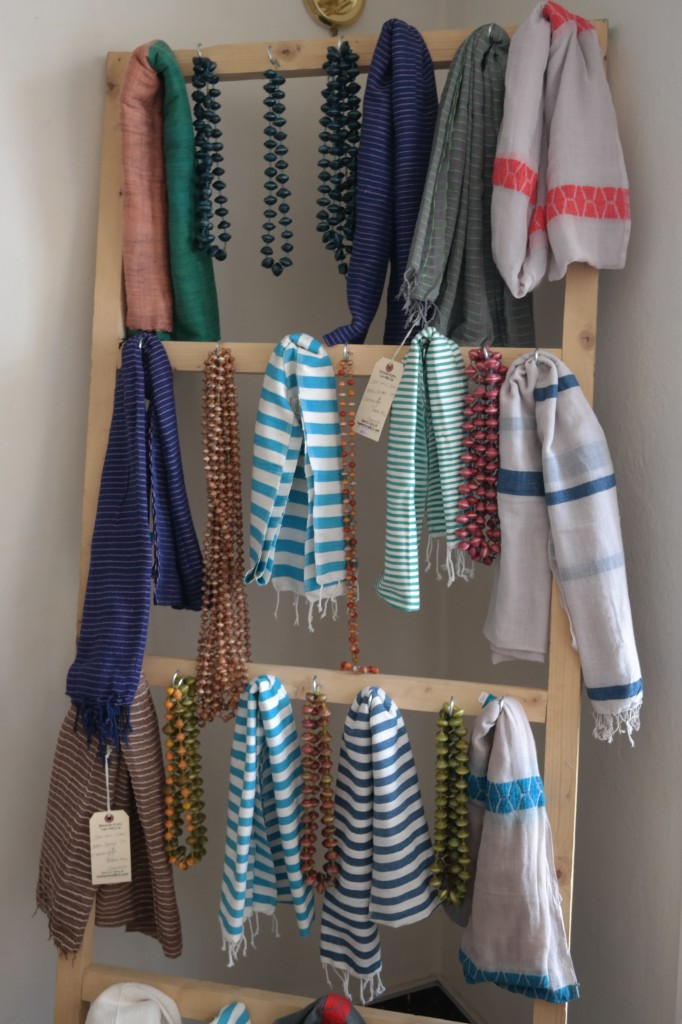
Twenty years ago Cherry had completed her university degree in business, but was still unemployed. Driving with her family one night past the prostitutes on the streets of Addis Ababa she and her family sparked a discussion that left her wondering about what separated her life from theirs. The street women who flashed them as they passed stayed in Cherry’s mind. She was an educated woman who could not find a job, how were these women supposed to find decent jobs if she couldn’t? She began going out at night to speak with the girls on the street and formed relationships that then became the foundation of “Women At Risk”, an NGO providing rehabilitation and job skills training to provide the women with alternate opportunities.
Today “Women At Risk” partners with Ellilta Products where the gorgeous FashionAble scarves that Nicole Melancon and I first heard of through the ONE Campaign are made. We knew if we had the opportunity while in Ethiopia on our International Reporting Project #EthiopiaNewborns New Media Fellowship trip we would love to visit the facility ourselves. Eden Genet Melke, Ellilta’s Business Development Manager was gracious enough to welcome us to the headquarters, show us around, and share the story of how it all began. Forty to forty-six women a year now go through the program of six months of rehabilitation followed by six months of job training. The program has had a 96% rehabilitation rate of women being able to leave behind their life on the streets and create a new future for themselves, and their children.
Cotton has been grown as a crop in Ethiopia as far back as Queen Sheba, and the history of rich textiles are woven into Ethiopian heritage. Initially the women in the program, most of whom are single mothers, were hesitant to learn weaving. In Ethiopia weaving has traditionally been a man’s trade. Most Ethiopian men in the southern region know how to weave, and the women customarily have done the spinning, but once the women saw their finished products with their names on them, (each scarf comes with a name tag signed by the woman who made it) their sense of pride in what they were able to create emerged.
Here is how the process of transformation takes place
Raw Cotton
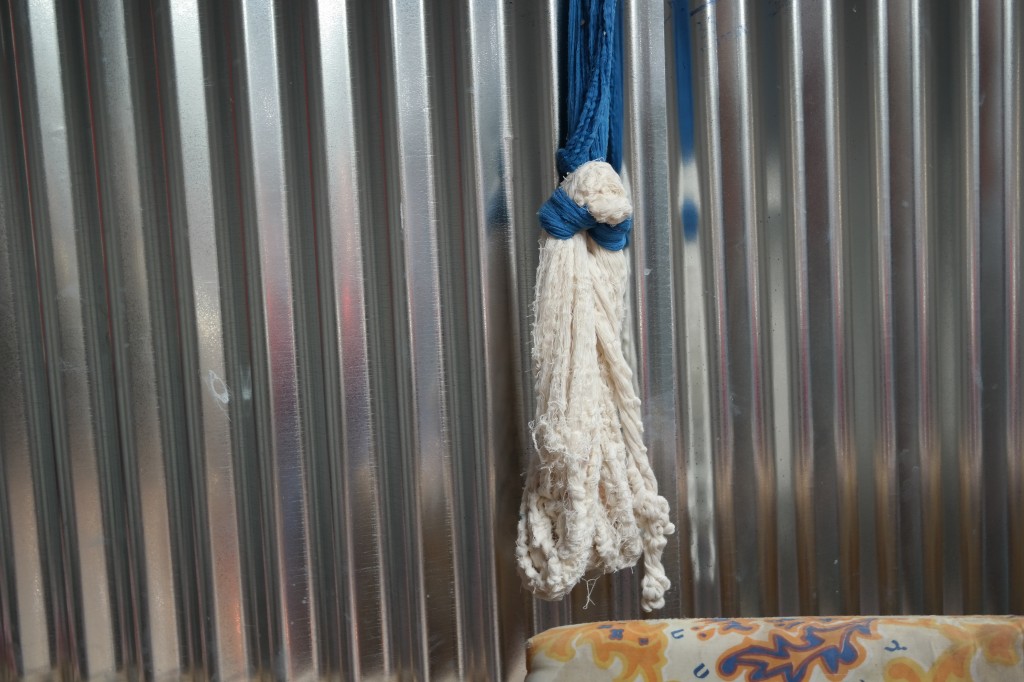
Colorful Dye
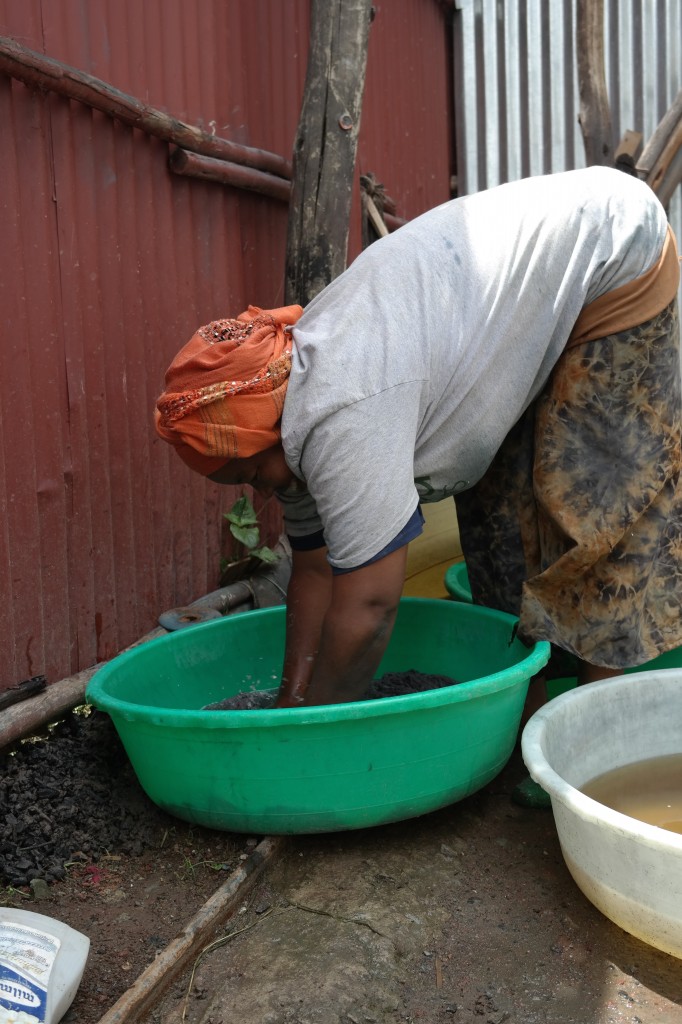
Dried In The Sun
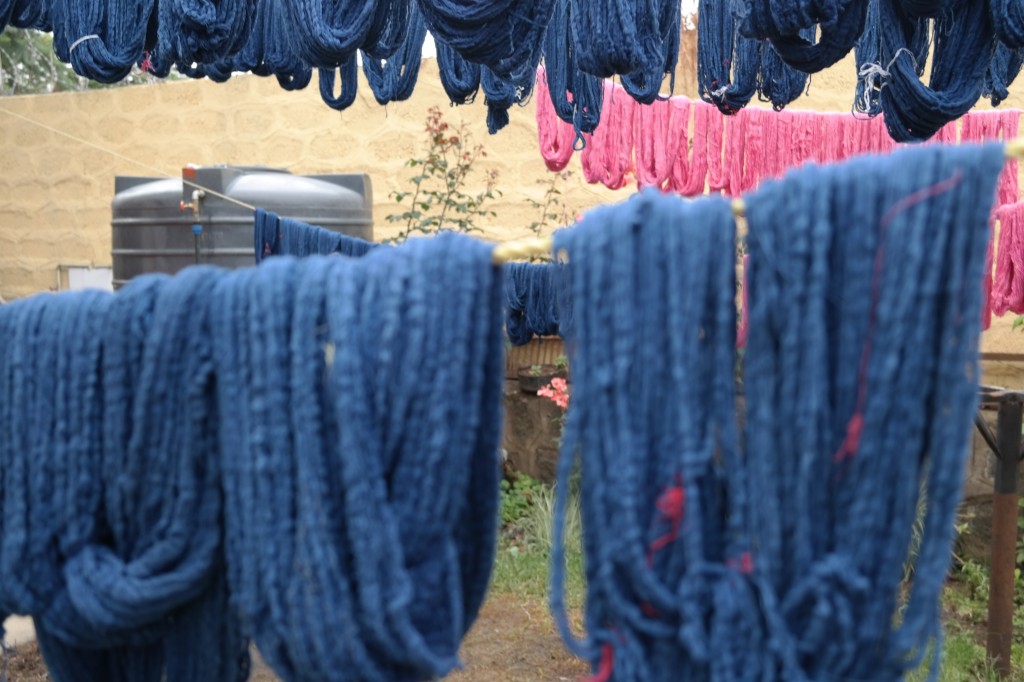
Spun
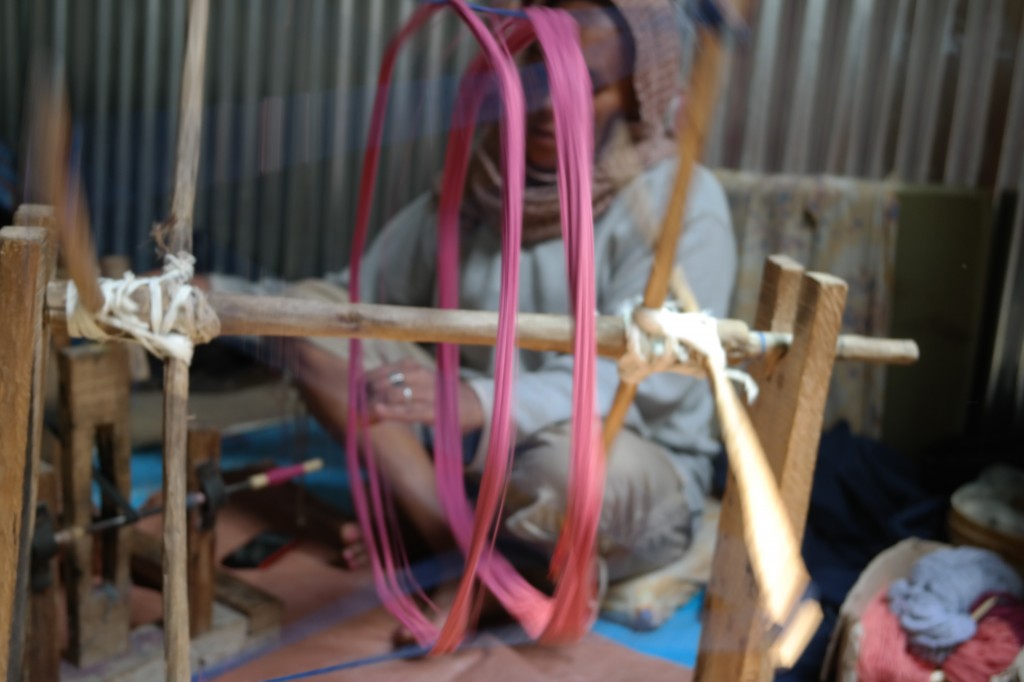
Then Woven Into the Beautiful Creations They Become
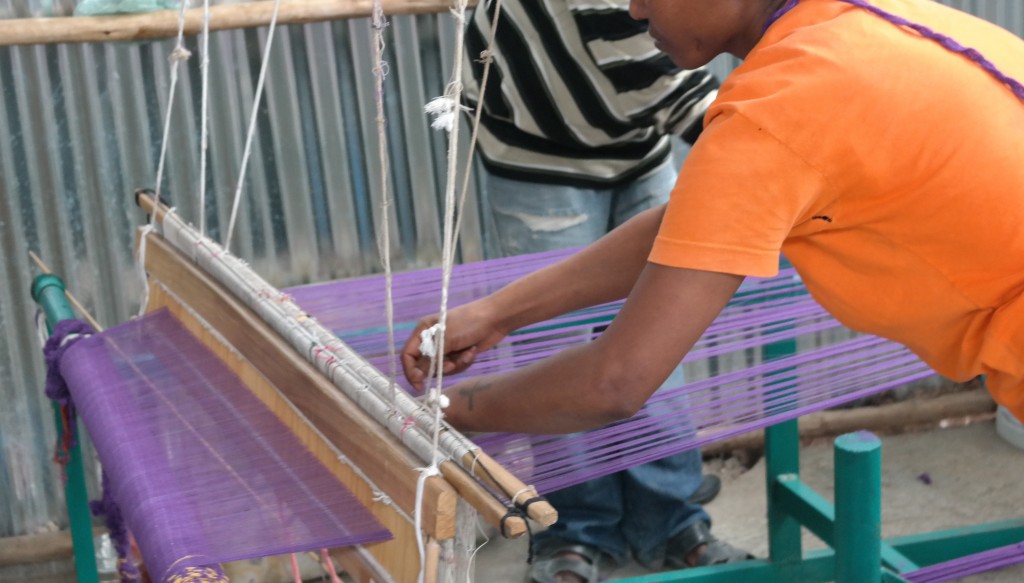
This is an original post written by Elizabeth Atalay of Documama for World Moms Blog
Elizabeth Atalay and Nicole Melancon were in Ethiopia with The International Reporting Project #EthiopiaNewborns New Media Fellowship reporting on newborn health.

Elizabeth Atalay is a Digital Media Producer, Managing Editor at World Moms Network, and a Social Media Manager. She was a 2015 United Nations Foundation Social Good Fellow, and traveled to Ethiopia as an International Reporting Project New Media Fellow to report on newborn health in 2014. On her personal blog, Documama.org, she uses digital media as a new medium for her background as a documentarian. After having worked on Feature Films and Television series for FOX, NBC, MGM, Columbia Pictures, Warner Brothers, 20th Century Fox, and Castle Rock Pictures, she studied documentary filmmaking and anthropology earning a Masters degree in Media Studies from The New School in New York. Since becoming a Digital Media Producer she has worked on social media campaigns for non-profits such as Save The Children, WaterAid, ONE.org, UNICEF, United Nations Foundation, Edesia, World Pulse, American Heart Association, and The Gates Foundation. Her writing has also been featured on ONE.org, Johnson & Johnson’s BabyCenter.com, EnoughProject.org, GaviAlliance.org, and Worldmomsnetwork.com. Elizabeth has traveled to 70 countries around the world, most recently to Haiti with Artisan Business Network to visit artisans in partnership with Macy’s Heart of Haiti line, which provides sustainable income to Haitian artisans. Elizabeth lives in New England with her husband and four children.
More Posts

by Susie Newday (Israel) | Jul 23, 2014 | 2014, Cancer, Death and Dying, Inspirational, Israel, Uncategorized, World Moms Blog
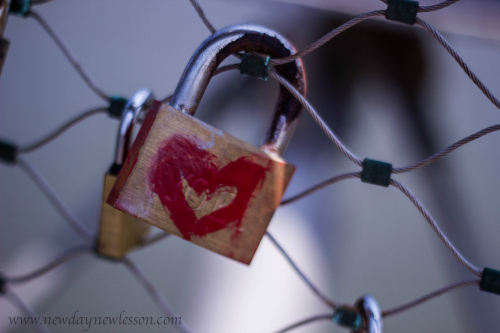
Had she not been a patient of mine and had my eye not been trained to see the telltale insults that cancer leaves on a body, I never would have known that her life was anything but perfect.
There are people like that in the world. People who smile through the worst. People who bring light to others and who know how to appreciate every moment with a vitality most of us lack.
She was one of the special ones. A special person and a patient with whom I connected on a deeper level. I was there to help guide her, but she was there to teach me about gratitude, optimism, tenacity, acceptance, love, courage and happiness.
She was an inspiration and a joy to be around. How I hoped she would be one of the few to beat the odds of metastatic breast cancer. And it looked like she might because she never stopped planning for the future or living her life in the present.
Unlike other patients and friends of hers who closed off the world or shut down when things took a turn for the worse, she never lost her huge infectious smile, energy, positive attitude or sparkle in her eyes.
Except for the last few days, and even then there was no self pity, just strength and determination. She was dying, in pain and in and out of consciousness but still fighting to hold on until her last wishes were fulfilled. She wanted her 8 year old daughter to come and say goodbye to her so her daughter would have some closure and she wanted her month old son, born to a surrogate mother, to be circumcised in Jewish tradition.
And she fought with her body to hold on. She saw her daughter for the last time and as soon as her son was circumcised later that same day, she took her last breath and our world was left a little dimmer as the light and joy that was her was released from her pain.
My only comfort is that she left behind an amazing family. A husband no less special than she, a daughter, a son, a mother, 2 sisters and a brother who all loved her deeply and will make sure that her special light and her precious gifts are not forgotten.
Every person who had the privilege of knowing her will never forget her, because although her years on this earth were short, she lived them to the fullest in a way many of us will never succeed in doing.
In these heartbreaking days in Israel, as we suffer our own private losses as well as national losses we choose to make our own, I think about my patient and the 29 young Israeli soldiers who died in the prime of their lives while fighting terrorists. Their deaths are more than just a grave loss. I think that their deaths are meant to be a “living” reminder for me. A reminder that it’s not how long you live, but rather how you live those years that you are given.
May all the families who are mourning the unfathomable loss of their loved ones somehow find the strength to continue to live life in the way they did.
And now I’m asking you all, how well are you living your years?
This is an original post to World Moms Blog by our contributor, Susie Newday in Israel. You can find her on her blog New Day New Lesson.
Photo credit to author.
Susie Newday is a happily-married American-born Israeli mother of five. She is an oncology nurse, blogger and avid amateur photographer.
Most importantly, Susie is a happily married mother of five amazing kids from age 8-24 and soon to be a mother in law. (Which also makes her a chef, maid, tutor, chauffeur, launderer...) Susie's blog, New Day, New Lesson, is her attempt to help others and herself view the lessons life hands all of us in a positive light. She will also be the first to admit that blogging is great free therapy as well. Susie's hope for the world? Increasing kindness, tolerance and love.
You can also follow her Facebook page New Day, New Lesson where she posts her unique photos with quotes as well as gift ideas.
More Posts - Website
Follow Me:






by Susie Newday (Israel) | Jun 30, 2014 | 2014, Death and Dying, Israel, Loss of Child, Susie Newday, World Moms Blog, World Motherhood
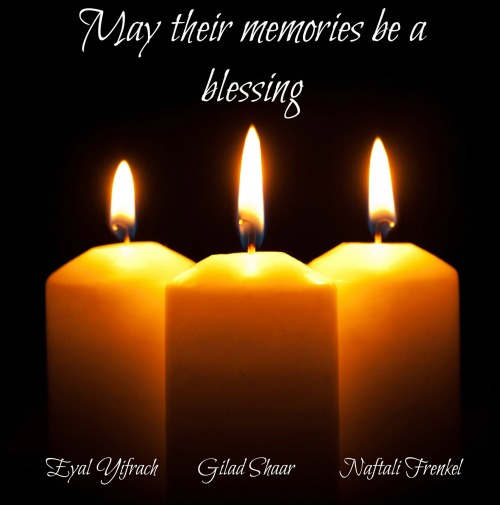
I’m writing this with tears streaming down my face. What everyone in Israel has been hoping never to hear, has happened. The three teenage boys who were kidnapped 18 days ago on their way home from school were found dead, buried together.
18 days of heartbreak, of feeling helpless, of hope and of unity. 18 days that have ended with the tragedy that we have all feared. During the past 18 days we saw so many glimpses of goodness and unity and support. 18 agonizing days and it’s so ironic because in Judaism, 18 is synonymous with life. In this case, it’s three lives that were brutally ended.
Tears are pouring freely. There is almost nothing on my Facebook wall this moment except an outpouring of grief and sadness. The whole country is in a state of mourning. From little children who have been following the news and saying psalms daily, to teens, to the elderly. We all have broken hearts and can’t even begin to fathom how Eyal, Gil-Ad and Naftali’s parents’ and families are breathing, let alone coping.
I wonder why there is evil in the world. I wonder how we can live in a world so full of evil and hate. I wonder why it is that so often we don’t see or appreciate all the goodness until something evil or awful happens. Do we need the evil in our world in order to appreciate the goodness? I hope not.
My heart is breaking and I am begging each and every one of you to make this world a better place. Be kind, do good and don’t turn a blind eye to evil.
May the memories of Eyal Yifrach, Gil-Ad Shaar and Naftali Fraenkel be of blessed memory. May they rest in peace and guide us in our quest to make this world a better place.
This is an original post to World Moms Blog by our contributor, Susie Newday in Israel. You can find her on her blog New Day New Lesson.
Photo courtesy of #BringBackOurBoys
Susie Newday is a happily-married American-born Israeli mother of five. She is an oncology nurse, blogger and avid amateur photographer.
Most importantly, Susie is a happily married mother of five amazing kids from age 8-24 and soon to be a mother in law. (Which also makes her a chef, maid, tutor, chauffeur, launderer...) Susie's blog, New Day, New Lesson, is her attempt to help others and herself view the lessons life hands all of us in a positive light. She will also be the first to admit that blogging is great free therapy as well. Susie's hope for the world? Increasing kindness, tolerance and love.
You can also follow her Facebook page New Day, New Lesson where she posts her unique photos with quotes as well as gift ideas.
More Posts - Website
Follow Me:






by Susie Newday (Israel) | Jun 25, 2014 | 2014, Israel, Life Balance, Motherhood, Parenting, Relationships, Susie Newday, World Moms Blog, World Motherhood
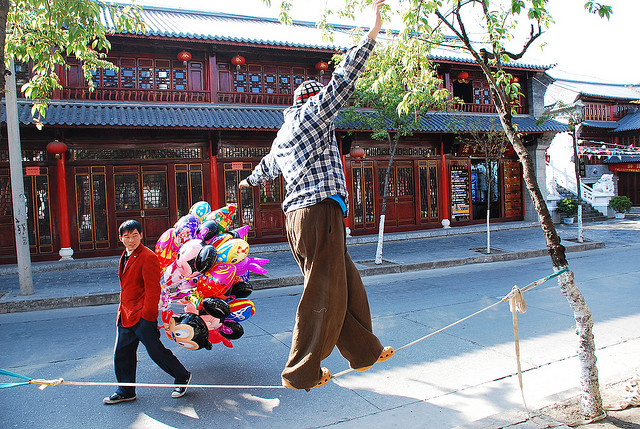
I feel like a tightrope artist struggling to walk the fine line of life.
Not just a lone tightrope artist finding her balance without an audience but one who is trying to navigate in between a myriad of other tightrope artists, each of us attempting not to fall down. Life really is a balancing act, and not just because of all the daily tasks we each have loaded on our plates.
Life is a gentle precarious balance between right and wrong, love and hate, acceptable and unacceptable, pleasure and pain, righteousness and irreverence, wants and needs.
Every single thing we say and do has the potential to hurt someone or to make them feel happy. The potential to be viewed as right or wrong. The potential to be hailed and brilliant or to be regarded as dumb. The tricky part is that you can perceive something or mean something one way and it can be perceived in a totally opposite way.
And when then happens you get blindsided and knocked down, yet somehow you have to find the strength to get back up on that fine line of life and regain your composure and balance. It’s not an easy feat since it can happen quite often and each time you fall or get pushed over, you are left with invisible scars that leave you more afraid and more vulnerable.
I think of all the times I have caused others pain and all the times I have been hurt. I worry about the scars I’m inadvertently inflicting on my children because I’m not skilled enough to stay balanced on that fine line and because I stray from that fine line time and time again. But I’m human and need to learn to forgive myself.
Walking that fine line is scary.
How often do you fall down?
This is an original post to World Moms Blog by our contributor, Susie Newday in Israel. You can find her on her blog New Day New Lesson.
Photo Credit: Tauno Tõhk / 陶诺 ? Flickr Creative Commons
Susie Newday is a happily-married American-born Israeli mother of five. She is an oncology nurse, blogger and avid amateur photographer.
Most importantly, Susie is a happily married mother of five amazing kids from age 8-24 and soon to be a mother in law. (Which also makes her a chef, maid, tutor, chauffeur, launderer...) Susie's blog, New Day, New Lesson, is her attempt to help others and herself view the lessons life hands all of us in a positive light. She will also be the first to admit that blogging is great free therapy as well. Susie's hope for the world? Increasing kindness, tolerance and love.
You can also follow her Facebook page New Day, New Lesson where she posts her unique photos with quotes as well as gift ideas.
More Posts - Website
Follow Me:






by Elizabeth Atalay | Jun 24, 2014 | 2014, Africa, Awareness, Babies, Birthing, Ethiopia, Health, Humanitarian, Maternal Health, Millennium Development Goals, Motherhood, Newborn Health, Pregnancy, Save The Children, Social Good, Third Eye Mom, Travel, World Moms Blog, World Voice
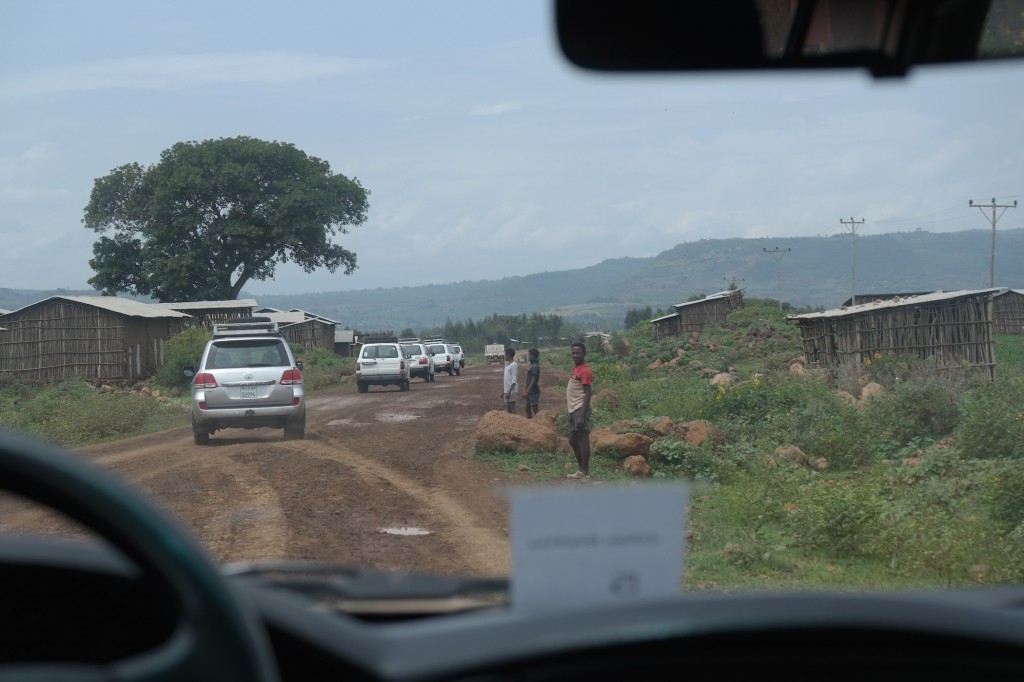
We had just spent the night at the source of the Blue Nile River. Lake Tana sits in Bahir Dar, Ethiopia, and as our caravan of Land Cruisers wove through the countryside from Bahir Dar to Mosebo I took in deep gulping breaths of sweet fresh Ethiopian air. The lush colors of our surroundings looked to me like they had been enhanced in Photoshop in the way that everything seemed to pop. How could I feel this emotional connection to place that was never mine? A place I had never been?
Though this is my first time in Ethiopia, the verdant landscape brought me back to other rural parts of Africa I’d traveled through in my youth, similar topographies that had stayed with me ever since. This time I’d returned to the continent as a new media fellow with the International Reporting Project to report on newborn health. World Moms Blog Editor Nicole Melancon of ThirdEyeMom is a fellow on the trip as well, and last week wrote about our initial overview of maternal and newborn health in Ethiopia. Now we were heading to one of the villages housing a Health Post, which serves the local and surrounding population of approximately 3,500 people.
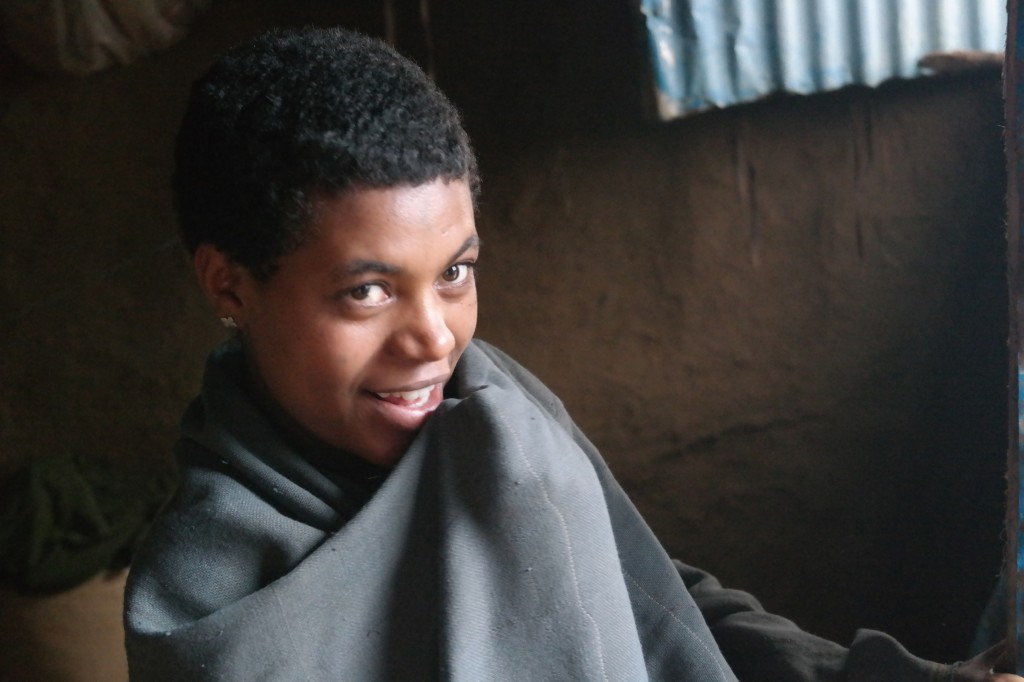
Mosebo Village is part of Save The Children’s Saving Newborn Lives program, and as such is looked to as a model village in the Ethiopian Government’s plan to reduce maternal and newborn mortality. Mosebo is a rural agrarian community that produces wheat, teff and corn. There I met seven-year-old Zina whose mother, Mebrate was about to give birth. Through our translator Mebrate estimated her age to be around 26, and told us that Zina was her first child. For economic reasons she and her husband had waited to have a second. When she had Zina, Mebrate had gone to her parent’s home to give birth, as women in Ethiopia often do. It is estimated that 80% of Ethiopian mothers will give birth in their home, often without a trained health care attendant. Towards the end of Mebrate’s first pregnancy she went to live with her parents as her family instructed, until after the baby was born. In that way her mother could help her deliver, could care for her and the baby, and feed her the traditional porridge after birth. Although there were no complications during her delivery, sadly, many young mothers giving birth at home are not as fortunate. The time period during and around birth are the most vulnerable for the lives of both the mothers and babies. The Saving Newborn Lives Program aims to reduce maternal and newborn mortality beginning with awareness programs and antenatal care on the local level at Health Posts like the one we visited in Mosebo.
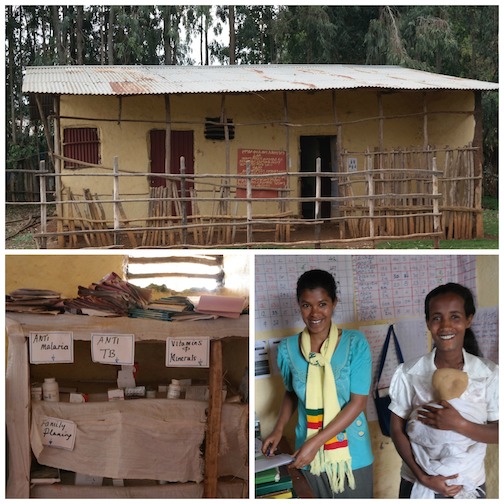
The Mosebo Health Post and Health Extension Workers
We had met Tirgno and Fasika, the two Health Extension Workers at the Mosebo Health Post earlier that day as they showed us the two room interior, and explained their role in improving maternal and newborn health. They work to raise awareness in the community about the importance of antenatal care, and the potential dangers of giving birth at home for both mother and child. Newborn health is interdependent with maternal health, and the most prevalent causes of newborn mortality, infection, Asphyxiation, pre-maturity or low birth weight, and diarrhea can often be avoided with proper care. These days in Mosebo after receiving antenatal care at the Health Post women are then referred to the regional Health Center for deliveries.
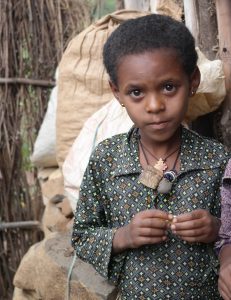
Zina shyly smiled when we ask her how she felt about having a new sibling, she stood straight and tall listening intently as we asked her mother about the babies’ arrival. When Mebrate goes into labor this time, with her second child, she will embark on the walk along rural dirt roads for around an hour to the nearest Health Center to give birth.
Elizabeth Atalay is reporting from Ethiopia as a fellow with the International Reporting Project (IRP). This is an original post written for World Moms Blog.
You can follow all IRP reports by World Moms Elizabeth Atalay & Nicole Melancon at #EthiopiaNewborns

Elizabeth Atalay is a Digital Media Producer, Managing Editor at World Moms Network, and a Social Media Manager. She was a 2015 United Nations Foundation Social Good Fellow, and traveled to Ethiopia as an International Reporting Project New Media Fellow to report on newborn health in 2014. On her personal blog, Documama.org, she uses digital media as a new medium for her background as a documentarian. After having worked on Feature Films and Television series for FOX, NBC, MGM, Columbia Pictures, Warner Brothers, 20th Century Fox, and Castle Rock Pictures, she studied documentary filmmaking and anthropology earning a Masters degree in Media Studies from The New School in New York. Since becoming a Digital Media Producer she has worked on social media campaigns for non-profits such as Save The Children, WaterAid, ONE.org, UNICEF, United Nations Foundation, Edesia, World Pulse, American Heart Association, and The Gates Foundation. Her writing has also been featured on ONE.org, Johnson & Johnson’s BabyCenter.com, EnoughProject.org, GaviAlliance.org, and Worldmomsnetwork.com. Elizabeth has traveled to 70 countries around the world, most recently to Haiti with Artisan Business Network to visit artisans in partnership with Macy’s Heart of Haiti line, which provides sustainable income to Haitian artisans. Elizabeth lives in New England with her husband and four children.
More Posts





























